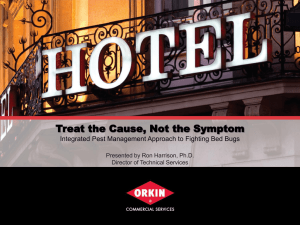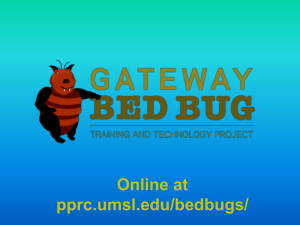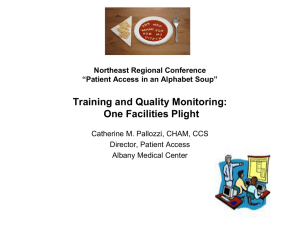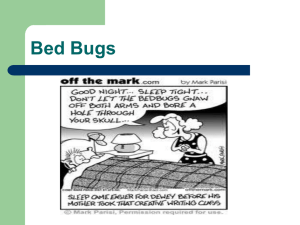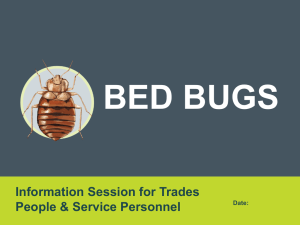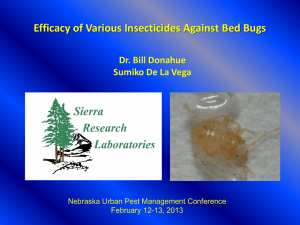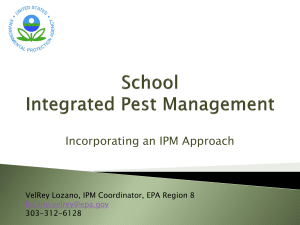An Introduction to Bed Bugs
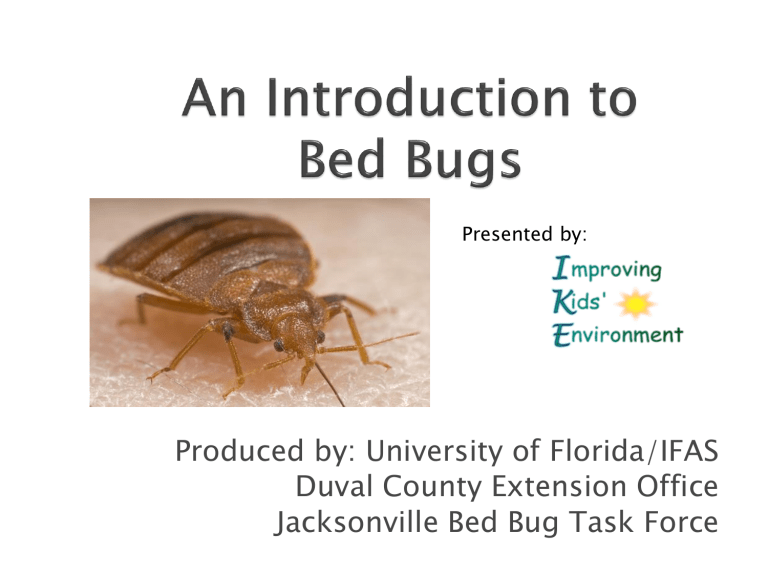
Presented by:
Produced by: University of Florida/IFAS
Duval County Extension Office
Jacksonville Bed Bug Task Force
Non-profit organization
IKE works to reduce environmental threats to children’s health
Lead poisoning prevention
Air pollution and asthma triggers
Pesticide exposure
◦
What are bed bugs?
Cimax lectularius
◦ Parasites
◦ Brown-Reddish Brown
◦ Oval-shaped and flat with hairs
◦ No wings
◦ Do not jump or fly but run fast
◦ Long piercing-sucking mouthpart
◦ Feed on blood
◦ Live near their hosts (people)
1)Bed bugs can’t be seen with the naked eye – False
( The adults are small (< ¼ inch) but can be seen.)
Lay about 3 eggs per day
5 Molts before they are adults
Maturation takes about 4-9 weeks
Lifespan can last 12-18 months
2)Bed bugs can live for many months without feeding – True (
Bed bugs can live up to one year without a bloodmeal)
3)Bed bugs are not know to cause or spread disease - True
Nuisance
Sleepless nights
Inflamed skin lesions
Stained sheets and mattresses
Psychological stress from infested environment
Home
School
Buses Day Cares and
Neighborhood
Centers
Hotels
Schools
Bed bugs are only found on the bed - False
Public
Transportation
Movie Theatres
Feed mainly at night, but will feed in daytime as well
10 mins, once a week
Long proboscis to “suck” blood
Unfed adult
H. Harlan ©
Bed bugs bite only at night -
False
Fed adult
H. an ©
H. Harlan ©
UF
Unfed nymph
UF
Fed nymph
Some People are not affected by bed bug bites - True
Not everyone reacts to bed bug bites
Bites are usually in rows
Do not transmit diseases
Secondary infections can occur
Most people who show symptoms develop them after 10 days the first time they are bitten.
If you have been bitten before then reactions may be immediate.
Quick movers
◦ Adults can crawl about 4 ft/minute
◦ Nymphs can crawl about 1 ft/minute
2½ minutes for an adult to make it from a TV stand to the pillow
10 minutes for a nymph
Bed bugs cannot fly and will not jump from the floor to the bed. - True
Look for blood spots and staining
Monitor for insect presence
Odor
Only dirty cluttered homes get bed bugs – false
If you have bed bugs you need to get rid of infested clothing and furniture – False
Discarded mattresses
Used Furniture
Encasing a mattress and box spring will prevent future bed bug infestation in your home. - False
Placed under bed posts
Monitoring device
Bed needs to be pulled away from the wall
After 2 weeks in an infested apartment.
Clothing and linens do not have to be washed first
Down-filled items resist heat
1 hour on high heat
Bed bugs die at 120
°
F after
1 minute of exposure
Thoroughly vacuum the carpet areas
Dispose of vacuum bag
In between uses place vacuum in heat or isolate in sealed bag
Use a steamer that reaches 115°-130°F. It will kill the eggs and nymphs and if you get a direct hit will kill the adults.
But even if you don’t kill the adults at least the steam will flush them out of their hiding place. Then you can use a HEPA vacuum to scoop them up.
Identify the insect
Determine source
Be discreet, inform parents
Follow IPM Action Plan
Educate
School Administrators
Parents
Kids
Acknowledgment:
Jacksonville Bed Bug Task Force
Erin Harlow, University of Florida/IFAS-Duval County
Dr. Phil Koehler, University of Florida/IFAS
Dr. Roberto Pereira, University of Florida/IFAS
Linda Prentice, Bug Out Services
Dr. Rebecca Baldwin, University of Florida/IFAS
Corrine McNeill, University of Florida/IFAS
Jennifer Leggett, Lindsey Pest Services
John Cooksey, McCall Service
Wayne Walker, University of Florida/IFAS
Margaret Huelsman and Indra Frank mhuelsman@ikecoalition.org
1915 W. 18 th St. Indianapolis, IN 46202
317-253-1312 www.ikecoalition.org



